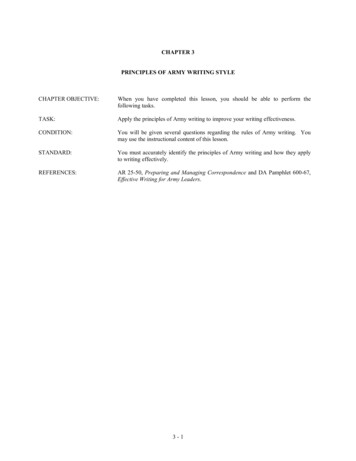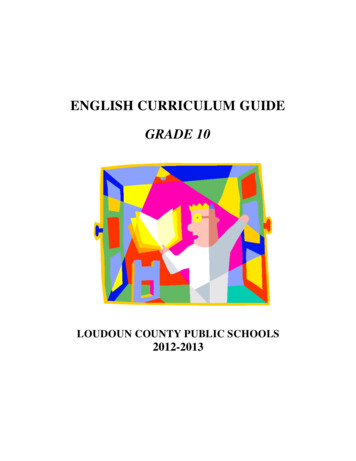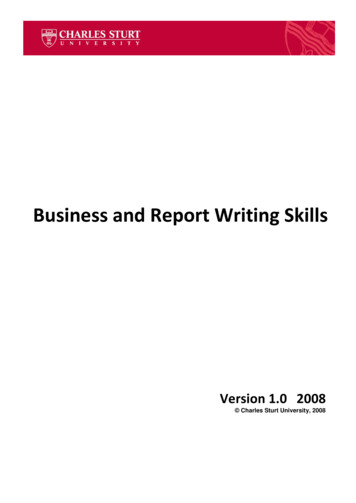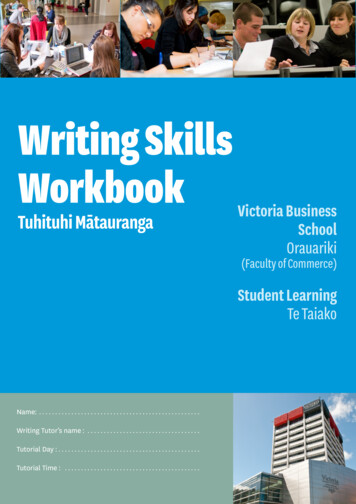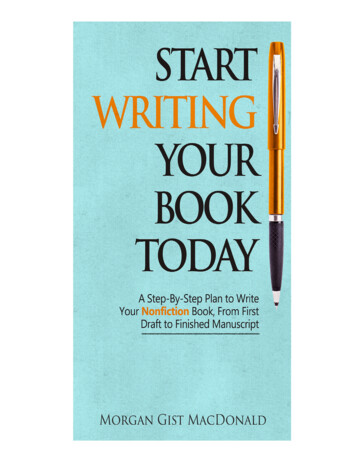
Transcription
START WRITING YOUR BOOK TODAY:A Step-by-Step Plan to Write Your Nonfiction Book,From First Draft to Finished Manuscriptby Morgan Gist MacDonaldStartWritingYourBookToday.com
“The most pernicious aspect of procrastination isthat it can become a habit. We don’t just put r forget: This very moment, we can changeour lives. There never was a moment, and neverwill be, when we are without the power to alter ourdestiny. This second, we can turn the tables onResistance.This second, we can sit down and do our work.”— Steven Pressfield, The War of ArtStartWritingYourBookToday.com
CONTENTSFREE BONUSINTRODUCTIONCHAPTER ONE: What it really takes to be a successful authorCHAPTER TWO: Preventing self-sabotageCHAPTER THREE: Good writing habitsCHAPTER FOUR: Writing the first draftCHAPTER FIVE: Beyond the first draftCHAPTER SIX: Dealing with criticismCHAPTER SEVEN: Finished manuscriptABOUT THE AUTHORCONNECT WITH MORGANStartWritingYourBookToday.com
FREE BONUS VIDEO7 Mistakes Writers Make(And How You Can Avoid Them)Available here:StartWritingYourBookToday.com/freebonus
INTRODUCTIONYou want to write a book. If you’re honest, you’ve wanted to write a book for along time, but when you sit down to start, the words get stuck. You feel your bodytighten and frustration rise. The ideas are in there, floating in your mind, but hereyou are, unable to put words to those very ideas. So, back you go to thinking,stewing, pondering, or any other euphemism you use for procrastination.You wonder if maybe there’s a trick to writing a book that you don’t know. Youread books from successful authors about how they write—Stephen King, AnneLamott, Ernest Hemingway, Virginia Woolf, William Zinsser, Steven Pressfield.Surely, the next book on writing you pick up will impart the secret wisdom you’vebeen missing all this time.And then you pick up this book. Maybe it was the title that caught you, thepromise of a roadmap from first draft to finished manuscript. Maybe you resonatewith the feeling that you want to start writing your book today, not next week, notnext month. Maybe you’re tired of putting off that life you want—the life of being apublished author, whose books make a difference in people’s lives. Let’s talk aboutwhat this book, Start Writing Your Book Today, is and is not. And how it can propelyou to start writing your own book.You’ll find Start Writing Your Book Today most useful if: You want to write a book, but you aren’t clear about exactly what the book will beabout. I’ll provide exercises to give you clarity. You are a motivated, excited writer. You’re done procrastinating, and this book’sstep-by-step plan is guaranteed to work, as long as you can bring the energy,from start to finish.Full Text Available At :StartWritingYourBookToday.com
You want to make a shift in your life and the lives of people around you. This bookwill show you how to harness the power of your words, so they can change theworld.In my years as a writing coach, I’ve come to realize that starting the firstdraft book often seems like it will be the hardest part, but it’s not. Convincingyourself that your book is worth all the sacrifice of time, energy, money, andeverything else in life—that’s the hardest part of writing a book.But let me promise you this: if you manage to keep in mind that your book isworthwhile, then you absolutely can write a book. Your grammar doesn’t have to beperfect; your idea doesn’t have to be worthy of a Nobel Prize; your life doesn’t haveto have room for four hours of writing a day. If you can hold on to the belief thatyour book will change your life and others’, you can write a book.In this book, I will coach you, just like I do with my author clients. I’ll give youall of my best advice and walk you through what it looks like to write a book, howlong you should plan to write every day, what writing a first draft feels like, how togo back and revise, how to solicit helpful feedback from editors and beta readers,and how to receive criticism in a way that strengthens your manuscript. I’ll let youknow where your greatest struggles will lie, and I’ll encourage you through theprocess.I’m going to be completely honest with you throughout this book. I believe, asyou finish the last chapter of Start Writing Your Book Today, you’ll feel competent,even compelled, to start writing your own book. As long as you don’t stop there,you will finish it.I’ll be here, cheering you on the whole way. Even better, I’d love to getinvolved as you start your book. Hearing about you and the book you’re about towrite helps me help you more. I read every single email, and I would love toreceive an email from you. Please to share with me what you’re writing about bysending me an email at morgan@morgangistmacdonald.com.
CHAPTER ONEWhat it really takes to be a successful authorIt takes a lot of guts to call yourself a writer. Even more to mean it. At socialgatherings, you dread being asked, “What do you do?” Maybe you throw in a quick“I write a little on the side,” and hope the conversation changes quickly. That firsttime you work up the nerve to say, “I’m a writer,” you feel a bit like a fraud. Why isthat? Why do you have that sudden desire to dash away any true claims to thetitle? Why do you want to add a phrase to soften the boldness of the claim? “I’msort of a writer, you know, when I have time,” or “I’d like to be an author one day.I even have some ideas. I just haven’t actually published anything yet.”There are many misconceptions about what it takes to be a successful author.I’m here to bust through those myths, to let you know that all of those assumptionsyou have about what authors are like or what kind of person you have to be arecompletely false. Then, we’ll talk about what it really takes.Myth: Authors have special, God-given, divinely inspired talents thatenable them to put words and phrases together effortlessly.Truth: Successful authors struggle with what words to use, how to describe aconcept, and what to write about next—just as much as the rest of us. Whatdistinguishes authors is perseverance. When authors aren’t quite sure what wordsto use, they don’t just throw up their hands in despair—they put down some wordsand keep going, knowing that they can always revise later. When authors aren’tsure how to describe a concept or idea, they give it their best shot and press on.When authors don’t know what to write next, they just write something, anything.Authors do not write effortlessly. Quite the opposite, in fact.
Authors are the ones who just keep typing, day after day, year after year. Itgets easier with time, but authors put in their 10,000 hours,1 just like everyoneelse. Usually, we don’t find out about an author until she’s already had greatsuccess. Agatha Christie received rejection letters for five years between finishingher first book and seeing it published. Five years! She went on to publish 91 books,amassing over 2 billion in book sales and gaining her the Guinness Book of WorldRecords title of World’s Bestselling Author.2 We focus so easily on the author’ssuccess, but what we don’t see is all of the years of writing toil before that success.Myth: Authors have a lot of free time. They get up, have a leisurely daythat involves a lot of walks, sessions of perusing the bookstore, coffeebreaks three times a day, and hours to just sit and think.Truth: Most successful authors began their writing career in the margins oftheir normal life. John Grisham was a full-time lawyer, so he would be at the officeat 5 am in order to get two hours of writing in before starting work.3 Danielle Steelwrote late at night and usually only slept for four hours so she could spend timewith her children during the day.4I haven’t reached the heights of Grisham or Steel, but I’m using them asinspiration in my own writing schedule. I’m writing this book while my four-monthold daughter lies next to me on the couch. She’s just had her first 30-minute feed(at 5 am), and now I have 30 minutes before my other two children wake up. Then,we all have school, work, and normal, busy lives through the rest of the day. At5:30 am, when I’m tempted to go back to bed (“just for a few minutes!”), I remindmyself that true authors are willing to make a book happen in small chunks of timeand in the margins of life.As E.B. White said, “A writer who waits for ideal conditions under which towork will die without putting a word on paper.”5
Myth: To be a successful author, you have to write every single day.Truth: I have heard this excuse a lot: “I can’t write every day, so I don’t thinkI could ever be a real author.” Yes, some authors do write every day, but that’s notwhat makes them successful. What makes them successful is they’re committed,whatever their schedule. Some write a little every day. Stephen King writes at least2,000 words a day.6 Some write for several hours a few times a week. Tom Pollockwrites on Monday nights, Wednesday nights, and during the day on Sundays.7Some write for weeks straight only a few times a year. Nathan Lowell doesn’t writefor months at a time, then will write 10,000 to 20,000 words a day while workingon a manuscript.8Don’t use your schedule as an excuse. So you really can’t write every day?How often can you write? Pick some times every week, or some days every month,or some weeks every year that you can write. Commit.Myth: Successful authors get published because they have specialconnections with agents or publishers, or someone in the know.Truth: There have always been ways around the “big publishers,” if you’rededicated to getting your book out there. Beginning in the late 1800s,9 there were“vanity” publishing houses, which allowed writers to pay their own way topublication. (Lewis Carroll published Alice’s Adventures in Wonderland, using hisown money and a vanity press.10) Throughout the 1900s, independent publishinghouses became more popular and more profitable, especially with the technology tomass-produce paperbacks in the 1950s11. Today, with the internet, gettingpublished is as easy as uploading a document to Amazon.Getting published isn’t and never has been the problem. What savvy authorsworry about is getting people to buy their book. The truth is that even if you get abook contract with a traditional publisher, big publishers put out more than a booka week, and they usually only have a few publicists, so they can’t publicize everybook effectively. Publishing houses have always put most of their marketing
firepower behind authors who have already sold well. So, it has always been anunfair market for the first-time author. It was unfair for Carroll and Rowling. Andit’ll be unfair for you, too.That said, book marketing is changing drastically. The number of people whospeak English, are literate, and have internet access increases constantly. Yourpotential readership is larger than it ever has been. You don’t need connections topublish. In reality, there’s a huge market already out there, just waiting for yourbook.Myth: For a writer to become a first-time author, you have to bewilling to spend a lot of money, like tens of thousands of dollars.Truth: You are going to spend some money, but it won’t be a fortune,especially when you consider the benefits of publishing. If you’re going the selfpublishing route (and I would highly recommend that you consider it), andassuming you already have a computer, you’re looking at spending a total of 2,500– 5,000 on an editor, a proofreader, a book cover artist, a formatter, andpossibly a marketing professional.12Honestly, though, even if you are able to land a traditional publisher, you’ll stillspend money out of pocket on some editing and publicity. (First-time authors do alot of their own marketing, even if they’re working with traditional publishers.) Youmay recoup some of your losses in sales of the book, or you may recoup them inincreased business, speaking gigs, new clients, new joint venture opportunities—who knows!That’s the exciting part of writing a book: you never know what doors it’llopen. Yes, it’s an upfront investment—not a fortune—but the rewards could behuge.
Myth: Successful authors are rolling in money.Truth: A few authors make a ton of money on their book sales. You know thebig names: successful authors including Bill Bryson, Malcolm Gladwell, JohnGrisham, David McCullough, James Patterson, Tony Robbins, J.K. Rowling, andDanielle Steel. While those people make a lot of money on book sales, most authorsdon’t. They spend a lot of time marketing their book; arguably, that means thebook profits just pay for their time spent doing that, so they can keep writing.Think about it. If it takes you 200 hours to write and revise the book, plus 50–100 hours on the actual publishing (art, layout, formatting), not to mentionhundreds of hours on marketing (radio shows, podcasts, blogs, TV shows, and booksignings), you’d have to make a lot of money on a book to earn even minimumwage back on 500 hours. Authors don’t do it for the money—they do it for theopportunities.So, if you’re hoping to churn out a quick e-book, make a ton of cash, andnever write another day in your life, this book may not be for you. I’m here to talkto the person who wants to write, feels drawn to writing and has a message toshare, is willing to put in some long hours, but just doesn’t have a clue how tostart.I’m talking to you because you’ve been lied to about the writing process. Somelies make writing sound harder than it actually is. Some lies make it sound easierthan it actually is. Now that we’ve separated some fact from fiction, let’s talk aboutyou writing your book.One undeniable truth: You can write a book.Whoever you are, you can write a book. If you have terrible grammar, you canwrite a book. If you only have chunks of 10–15 minutes throughout the day, youcan write a book. If you only have a vague idea of what you want to write and aninsatiable calling to write something, you can write a book. If you have no realconnections in publishing and no fortune to spend on your writing, you can write a
book. Heck, even if you have arthritis and can’t type, you can write a book. (Everheard of transcribers? That’s right. You talk, they type. You can write a book.)I’m not saying it’ll be easy. I’m saying it’s possible.It’s your own mindset that prevents you from writing your book.We pour too much of our irreplaceable time and energy into these old mythsabout what it takes to be a successful author. How many times have you sat infront of a laptop screen, unable to find the right words, and you’re thinking toyourself some version of these myths? “I just don’t have the God-given talent thatother writers do.” Maybe, “If I just had more time, I could get my thoughts straightand write.” Or, “Even if I do write a book, no one’s ever going to read it because Idon’t have any connections in the publishing industry.”Every minute that you allow your brain to turn those thoughts over and overagain is a minute of wasted time and energy that you could have been using towrite your book.Instead of letting your thoughts focus on what you don’t have, direct yourthoughts to something more useful—namely, why you want to write your book inthe first place.Look, writing a book is a battle. That battle will be won or lost in your ownhead. If you believe that writing is something only for special people with lots oftime, talent, connections, and money, I can tell you right now that you’ll neverwrite a book.But, if you believe that anyone can write a book, that anyone can gather theirthoughts into words, put them on paper, and shape them into something that helpsother people, then you have just taken your first step toward success.The best way to win the mental battle of writing is to constantly redirect yourthoughts to why you’re writing your book. Let’s talk about some of the good,worthwhile reasons to write a book.
You’re just curious: Maybe you feel a mysterious tug, a curiosity that keepsrecurring in your mind. Even though you try to put aside the thought of writing abook, it just keeps coming back to you, almost like a challenge. Can you do it?You’ll never know if you don’t try, and part of you wants to give it a go.You want to help others: Maybe you have some knowledge, advice, orexperience that you think would be useful to a group of people. Perhaps you’veworked in an industry for many years and come up with ways to improve how itworks. Perhaps you’ve had some hard times in life, learned a lot of lessons alongthe way, and you want to pass on the advice you wish someone had given youyears ago. Perhaps you’ve had some experience in life that you simply feel needs tobe shared. All of these are great reasons to write a book, and helping others isalways a worthy cause.You want to tell your story: Some of the best conversations occur when wesit down and give space for the other person to tell her story—not just the bulletpoints version or the history plotted on a timeline version, but the fleshed-out-inall-its-glory-and-gore version. When a friend bares her story and lets us truly seehow she has come to be who she is, there is a true, palpable connection.We can feel the same way when we read someone’s story in a book. Words arepowerful, whether written or spoken. If you have the sense that your story couldtouch someone else’s life in a powerful way, well, that’s one of the best reasonsthere is to write a book.You have a business: If you serve clients or develop products, you havesome expertise. Maybe you shrug your shoulders instinctively when I say, “Youhave expertise,” like you want to brush off what you’re capable of, but it’s true. Thebest way to lay claim to that expertise, to live in it, to truly recognize it, and toshare it with others is to write a book. A book establishes you as an expert in thefield. Every field has experts. If you aren’t claiming your space as one of them, then
you’re allowing others to fill that gap. Wouldn’t it be better for the world if youstepped in and laid claim to that talent of yours?You want to start a business: You don’t have to wait until you have clientsor a product before you write a book. A book can be one of the best ways to attractnew clients. If you feel the urge, don’t wait. Go ahead and write the book! It’ll pavethe way for your business.You have a message: Maybe you aren’t sure that a book is the only way tospread your message. You bounce back and forth between starting a blog, writing abook, recording a podcast, shooting YouTube videos, or just going out and talkingto people. None of them are mutually exclusive! I would recommend pursuingwhatever options you feel are good for you, but know that writing a book could takea while, so go ahead and start writing anyway.Any other reasons? Tell me, why did you pick up this book? You must have abook idea in your head and a reason to start writing. I would love to hear yourreason. Really! Share your book idea and why you want to write a book by emailingme at morgan@morgangistmacdonald.com.Full Text Available At :StartWritingYourBookToday.com
ABOUT THE AUTHORMorgan Gist MacDonald is a writing coach and editor of nonfiction writing, aswell as the founder of Paper Raven Editing and Paper Raven Publishing. She lives inHouston, Texas, with her husband, three children—Cora, Ewan, and Meredith—andtheir pet guinea pig.When Morgan is not writing or talking about writing, she enjoys readinganything from history to sci-fi/fantasy, playing nerdy Euro board games, andoccasionally picking up a tennis racket. Morgan and her family also love to travel.“Life is an adventure, and this is only the beginning.”
CONNECT WITH MORGAN Get a full copy of this book, plus more resources for writing your own book at :StartWritingYourBookToday.com See Morgan's books at : amazon.com/author/morgangistmacdonald Morgan offers her writing coaching/editing services, plus regular blog content for writers, at : paperravenediting.com Connect with Morgan and Paper Raven Editing on avenEdit
Lamott, Ernest Hemingway, Virginia Woolf, William Zinsser, Steven Pressfield. Surely, the next book on writing you pick up will impart the secret wisdom you’ve been missing all this time. And then you pick up this book. Maybe it was the title that caught you, the promise of a roadmap fr

